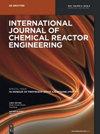刚柔叶轮搅拌罐中粘性流体的混合特性研究
IF 1.4
4区 工程技术
Q3 Chemical Engineering
International Journal of Chemical Reactor Engineering
Pub Date : 2024-03-06
DOI:10.1515/ijcre-2023-0219
引用次数: 0
摘要
将刚柔结合的叶轮(RF 叶轮)用于粘性流体的混合过程,并通过数值模拟和实验分析探讨了 RF 叶轮的混合性能。结果表明,与拉什顿涡轮(RT)相比,RF 叶轮可降低功耗(P),体现出节能优势。射频叶轮与周围流体之间的力耦合效应更加明显,与 RT 相比在流场中表现出更优越的适应性。同时,与 RT 相比,利用射频叶轮可有效增强高速区的扩展、扩大空腔区,并在保持 P 不变的情况下降低混合效率数,而且高速区和空腔区的尺寸可随叶轮转速的增加而增大。此外,通过可视化实验获得了空腔结构,结果与模拟结果相似。研究结果表明,在粘塑性流体混合过程中,叶轮叶片采用刚柔结合的结构设计可有效扩大空腔区,减少滞流区,提高混合效率。本文章由计算机程序翻译,如有差异,请以英文原文为准。
Study on mixing characteristics of viscoplastic fluid in a rigid-flexible impeller stirred tank
The rigid-flexible impeller (RF impeller) was used in the mixing process of viscoplastic fluid, and the mixing performance of RF impeller was explored by using numerical simulation and experimental analysis. Results indicated that RF impeller could reduce the power consumption (P) and demonstrate the advantage of energy-saving compared with Rushton turbine (RT). RF impeller demonstrated a more pronounced force coupling effect between the impeller and surrounding fluid, and exhibited superior adaptability in the flow field compared with RT. Meanwhile, the utilization of RF impeller can effectively enhance the expansion of high velocity region, expand the cavern zone, and decrease the mixing efficiency number while maintaining constant P compared with RT, and the size of high velocity region and cavern zone could be increased with an increase in impeller speed. Moreover, the cavern structure was obtained through the visualization experiment, and the results were similar to that in the simulation. The findings suggested that incorporating rigid-flexible combination structure design of impeller blades could effectively expand the cavern zone, reduce the stagnant zone, and enhance the mixing efficiency in the viscoplastic fluid mixing process.
求助全文
通过发布文献求助,成功后即可免费获取论文全文。
去求助
来源期刊
CiteScore
2.80
自引率
12.50%
发文量
107
审稿时长
3 months
期刊介绍:
The International Journal of Chemical Reactor Engineering covers the broad fields of theoretical and applied reactor engineering. The IJCRE covers topics drawn from the substantial areas of overlap between catalysis, reaction and reactor engineering. The journal is presently edited by Hugo de Lasa and Charles Xu, counting with an impressive list of Editorial Board leading specialists in chemical reactor engineering. Authors include notable international professors and R&D industry leaders.

 求助内容:
求助内容: 应助结果提醒方式:
应助结果提醒方式:


